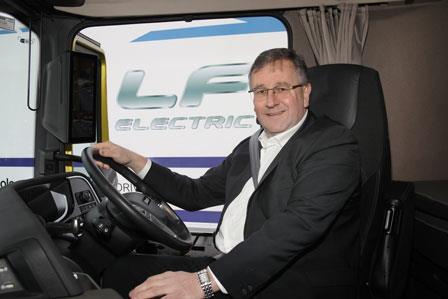
Asset Alliance Group (AAG) has been a long-term supporter of Motor Transport’s annual state of the trucking nation report Industry Monitor, and in the 2022 edition CEO Willie Paterson described himself as an “optimist”, as 70% of operators said they planned to add extra trucks to their fleets this year.
But the launch of the 2023 edition in this issue of MT coincides with inflation in double figures, interest rates at 5% for the first time in more than a decade and the UK economy teetering on the edge of recession. So MT’s first question when we met in March this year was ‘are you still optimistic about 2023?’
“We will continue to develop and thrive and joining Arbuthnot was a really smart decision for both of us,” he says. “Covid-19 accelerated that as we needed to rethink our business model and it put us in a position of undoubted financial security. They have invested heavily in our business and expect us to take full responsibility for managing it.”
Asset Alliance was founded by Paterson in 2010 and merged with ATE Truck and Trailer Sales in 2012 to form AAG. It was acquired by 190-year-old private bank Arbuthnot Latham in 2021; that year the bank made £4.6m pre-tax profit on turnover of £88.7m and had net assets worth £200.9m. Its 2022 results were far more impressive, with a pre-tax profit of £20m on turnover of £137.4m and net assets of £212m.
A former banker himself, Paterson is confident that despite a handful of banking failures around the world UK banks are solid. And, despite strong criticism of the government’s mismanagement of the economy, Paterson says the financial services sector remains a key powerhouse for the UK.
“The financial sector is incredibly strong,” Paterson says. “That is the only thing really propping up the UK economy. We have huge businesses that support the automotive sector – do we manufacture anything? No. Do we assemble things? Yes, lots.
“The thing that galls me as an economist is that we have to be taxing people better. No one wants to be taxed but we have to pay the bills and too many young people think they can have what they want when they want it. All we are doing is passing debt down the line.
“If government thinks all they need to do is take on more debt and inflation will deal with it, that is commercial suicide.”
As a proud Scotsman, Paterson also despairs of the nationalist government in Scotland and worries that Brexit and Scottish independence could ultimately lead to the break up of the UK. The rupture in Anglo-Irish relations since the UK left the EU has already seen AAG’s previously substantial business on the island of Ireland almost disappear.
But its UK business remains in good health and with the help of Arbuthnot’s backing AAG is slowly catching up on its asset replacement programme which was delayed by Covid-19. It currently has 4,200 owned vehicles on the road – plus another 1,000 on fleet management contracts – all managed from five sites and Paterson takes pride in having the youngest contract hire fleet in the market.
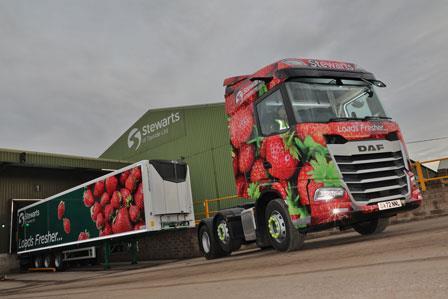
“We replaced 1,700 vehicles last year and we are planning to do another 1,700 to 2,000 this year,” he says. “A lot of that will be replacement of existing fleet plus some growth.”
AAG is expanding its presence in the bus and coach market it acquired in 2016 when Forest Asset Finance was merged into the group.
“Our intention was to convert it from a broker into a lender but we never had the capacity to do that because the commercial vehicle business was growing so fast,” says Paterson. “We have had 50% growth year-on-year since we started but we now have the capital and intend to do £100m of lending in that division alone this year. That will help with my plan to get the fleet up to 8,000 vehicles in the next three years."
Supply of bus and coach chassis is just as tight as it is for trucks but AAG has good relationships with its suppliers.
“We managed to get enough chassis supply in 2022 to meet our objectives,” says Paterson. “We have enough already hard-baked in for 2023. That wasn’t an easy job and my plan during Covid was to get the financial stability to give me the confidence to place orders when nobody else was doing it – and that worked.
“The problem was when we entered Covid we couldn’t get the supply we wanted. Nevertheless, we have been buying trucks and getting orders filled when others weren’t and that has served us very well.”
The PSV market is adopting zero emissions technology much faster than HGV operators, helped by public subsidies and local authorities keen to clean up air pollution.
“We have hydrogen, electric, hybrid and gas buses and have had for years,” says Paterson. “We’ve just done our first replacement cycle on electric buses with a battery swap after seven years. So there is learning there.
“The reason it works is that it is a subsidised market sector where the councils have control or own those fleets. TfL has a mandate to meet certain objectives and they will make it happen. I had hoped what was happening in London would spread to other cities with low emissions zones. It hasn’t happened as quickly as I thought but it is starting to happen now. Glasgow has moved the First Bus fleet to electric, Edinburgh have hybrids and Manchester is the next major conurbation to go.”
In the 202 Industry Monitor 61% of truck operators said they expected to be operating alternatively-fuelled vehicles soon and Paterson admits that electrification is already moving faster than he expected.
“We are playing catch up and have had something of a rude awakening,” he says. “I had thought the change was a little further away but in the last year things have been happening quicker than we expected. We speak to all the major manufacturers at European level and are guided by them.
“Some are still in the dark and don’t know how they are going to reach the targets – but they simply have to reach them because the fines will be huge. So some are driving the change and we are very close to that.
“We are actively looking at the supply of green hydrogen as we think it is the only economic substance available. We have a small taxi business in the group with 1,000 taxis in London and looked closely at putting a hydrogen generation system in there. The numbers stacked up but the risk was that we would need to put in around 10 small containerised generation stations that would be plugged straight into the mains. That was the deal breaker for us as the big variable is the cost of electricity.”
Paterson now believes AAG will at some point be able to offer its customers a turnkey green hydrogen solution encompassing vehicles and fuel.
“We think we can potentially move to supplying a vehicle and a fuel supply contract at a fixed price,” he says. “If you have wind turbines and solar panels plus battery storage that can be a solution to the problem as it gives you fixed price hydrogen for a long period of time.”
While some observers believe only government can decide which direction to take the UK energy sector to deliver net zero carbon emissions by 2050 Paterson is not waiting on the politicians.
“I wouldn’t want to trust the government to make that decision,” he says. “I don’t think they are capable of making it. They are capable of incentivising it and acting as a catalyst - regulation is the biggest catalyst and the manufacturers have signed up to it and have to deliver.
“The innovation will then come from the manufacturers, possibly helped by government or university funded research and grants for example. In Glasgow there is a new hydrogen truck business that has had huge grants given to it and that hopefully will lead to something.
“We don’t want to be the first adopter but we definitely want to be an early adopter. I want to be able to go to my customers and say ‘if you want electric, we can give you electric. If your pay load is high and you are not back-to-base, then you are a hydrogen customer’.
“In the space of three months ago I changed my view from thinking I was a year away from having to do anything about this. I am now seeking a senior individual to come into our business to steer us through this period of change.”
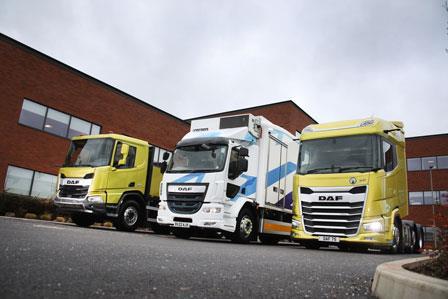
AAG needs to be able to offer its customers the right tool for the job and recently placed an order with DAF Trucks for 1,500 vehicles worth more than £160m which will include at least 75 trucks from DAF’s electric range.
While the bulk of the order will be a mix of diesel New Generation DAF XF and XG tractor units there will also be a tranche of XD tractors and rigids with both electric and diesel drivelines.
Deciding what zero emissions vehicle is right for which application won’t just depend on pay load however.
“We have just started a data management project with some consultants looking at how we analyse the data we have in the business to better understand the needs of our customers against the capabilities of the products available,” says Paterson. “Then we can go back to the manufacturers and say ‘we think we are best placed to do this, you need to give us the data on what you can do and keep working with us’.
“The benefit we have is that we own a massive used truck business – probably one of the top three in the UK – so we are agile enough to take more commercial decisions on residual values. We are not a bank which has to have a fixed price at a fixed time. We can steer through that in a way that some of the vendor finance companies just can’t.
“’I previously ran a bank’s commercial lending division and I know how difficult it is for them to be flexible. The model for our business is to deliver that flexibility and agility.”
While Paterson understands the view that banning the sale of all new diesel trucks from 2040 is not feasible, he points to the rapidity of technical developments in recent years.
Holding up his smartphone he says: “We run our lives with these. They’ve only been around for 20 years. We have lived through an incredible 20 years of progression and battery technology is moving dramatically. So I think we will be there in 17 years – we will have to be. It is coming so much faster than we thought it would.”
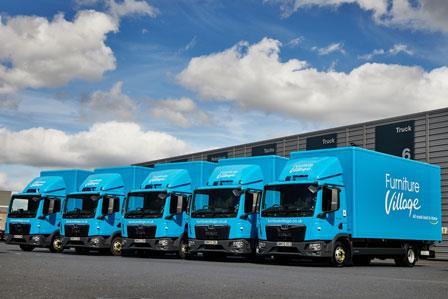
Paterson also points out that the part of diesel vehicles will continue running for “seven to 10 years” after the 2040 deadline and predicts there will be a surge in internal combustion sales in the run up.
“I am seeing buying patterns slowing down at the moment and I’m convinced it is to do with people pushing that churn back to one or two times,” he says. “If you look at RVs, they normally follow a five-year wave. Depending on what happens in the next year with new vehicle pricing – and they are starting to soften – I think we will see an unusual RV curve in the next five to 10 years.
“RVs are at their peak at the moment. I believe that while they will soften they won’t go back to previous levels and will hold up for the next three to five years. Depending on how efficiently the change is introduced they will then either hold up or even go back up again.”
A lot of operators were spooked into buying Euro-5 trucks ahead of the switch to Euro-6 in 2014 only to see RVs crash, and Paterson believes lessons may have been learned about investing too heavily in out-going technology.
“That has spurred some of the larger businesses to say ‘let’s just adopt this and use it as a USP for our customer base’,” he says. “We are owned by a private bank and people have a choice of where they invest their funds. ESG definitely has a role and I am being asked ‘what part are you playing in our zero-carbon agenda?’ That is why I’m employing someone to steer us there faster and smarter.
“But we have to be pragmatic and understand we can’t fix the problem overnight. There is a balance in there somewhere.”
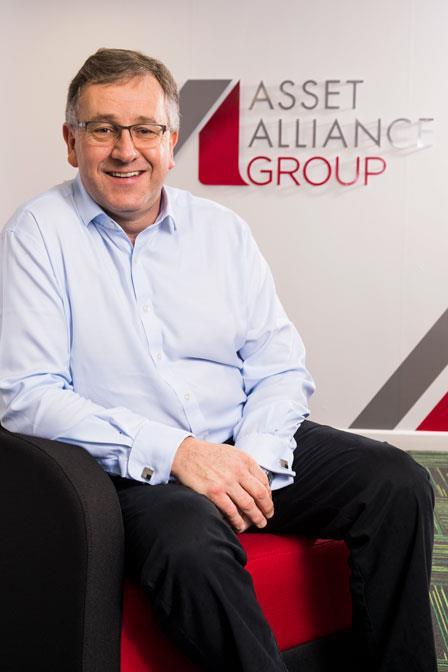
This new world order will present particular challenges to the contract hire sector as upfront costs of zero-carbon vehicles will be much higher while running costs in theory should be lower. How will this shift be shared between the funder and the operator?
“Over the last 10 years we have seen new truck prices double,” Paterson says. “We are bullish on RVs because we have to be but if I have to pay £300,000 for an electric truck and my customers are in the habit of paying £600 a week for a truck, they are not all of a sudden going to be able to pay £1,000.
“Some of them have an agile model and can, but the majority can’t. So we have to work with the manufacturers and say for the first period we will take a commercial decision on it, try to hedge some of that initial risk with our back book and hope it will all balance out. The change in technology can’t be too rapid – we have to find a safe pace to do it.
“I can’t go out and order 1,000 electric trucks right now but I can order 150 and start placing them through our business.”
Even before quickening its pace of adoption of alternative fuels AAG had been working with more truck manufacturers than before.
“We deal with every manufacturer and one good thing in the last three years is we have had to widen our supply base,” says Paterson. “Four years ago we had three core suppliers which we would speculatively order from and, to make sure we had the resources available and that the economies work for us, we would pre-buy big numbers. The majority of the others we would only buy from to meet specific customer requirements.
“The inability of our core suppliers to meet that supply in recent years meant we had to go and speak to every manufacturer, and that has been a positive turn. We have bought assets from manufacturers we wouldn’t have in the past and been pleasantly surprised. We have a more stable, balanced portfolio and have good relationships with every manufacturer, some better than others, and we are well placed to develop those going into this next stage.”
One of those pleasant surprises was Maxus, the Chinese manufacturer that was early into the electric van market, and whose product AAG bought when there were few alternatives. “We’ve had no problems with them,” says Paterson. “It has been a good experience.”
No Ryder dividend
The shock exit of US-owned Ryder Europe from the UK contract and hire and rental market left several thousands of vehicles looking for new owners, but Paterson took no pleasure in seeing another competitor disappear from the market.
“It is never good to lose any major business,” he says. “It was disappointing to lose Ryder from the UK market as there were a lot of good people there. I never like to see any business fail and it’s not good for our economy.
“We recruited some good people and bought some embedded assets. We won’t make any money on them but we have secured some good customers It’s a long term play”
Is this is the end of inhouse R&M?
While electric vehicles are said to be simpler to maintain than their diesel equivalents it will be a brave workshop manager who wants to mess with high power 400V or 800V battery packs let alone hydrogen fuel tanks pressurised to 300 bar.
The arrival of Euro-6 with its complex electronics had already seen many operators and leasing specialists withdraw from inhouse R&M and AAG was no different. It rented out its 120,000sq ft Wolverhampton workshop five years ago and now relies on dealer R&M packages for its fleet.
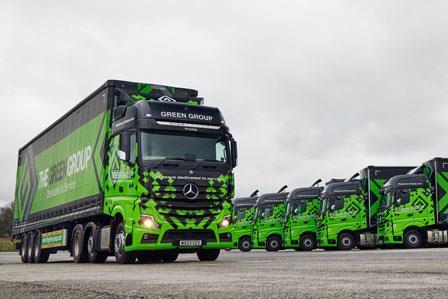
“We have moved entirely to buying fully-maintained contracts from the manufacturers,” says Paterson. "We monitor them very closely and gather the data so we can manage the relationship with our suppliers. We think it is the right thing to do and a natural hedge against inflation. It is just one less thing to worry about at the moment.”
This approach helps reinforce the close working relationships AAG needs with its suppliers as the industry enters a period of unprecedented change and maybe instability.
“The major manufacturers we work with understand what we are trying to achieve and it ticks their boxes,” says Paterson. “To get the supplies we need we have tried to understand their needs too and we have had a meeting of minds on this. I can’t use their finance facilities because we are a bank and I’m cheaper than them, but I will buy their maintenance and look at extended warranties. That helps them to help us.”
By and large Paterson is happy with the R&M service he receives from dealers and says the six-week waits for service slots are starting to ease. His key priority remains communication from the dealer.
“If the vehicle can’t be fixed, as long as we have absolute clarity in that communication, that can be dealt with,” he says. “What you can’t do is tell someone who has a £2m load of salmon on the back of his truck that it will be fixed in three hours when it clearly won’t be. The biggest challenge is when they don’t trust what they are hearing and start interfering. Then everything goes wrong and we have tried to use technology to shorten those lines of communication.
“We had a period of having major issues with supplying relief vehicles to customers with vehicles going off the road because we simply didn’t have vehicles to give them. But ordering large numbers of new vehicles and taking a lot of used vehicles back has given us the ability to support those customers and the dealers better.”
UK no longer head of the queue for new vehicle allocations
While availability of vehicles is slowly getting better, shortages of some components are still holding up deliveries.
“The biggest issue for some of the manufacturers is third party supply chains,” says Paterson. “We still have vehicles delayed because we can’t get sensors or some other electronic part. We have a couple of manufacturers who have serious parts supply problems and that causes massive knock-backs. We have vehicles that were due in October and are now coming in April so we have paid for trucks that aren’t going to hit the road any time soon.”
Paterson also believes that the UK is no longer at the front of the queue when the European manufacturers allocate limited quantities of new trucks leaving the production lines to their key markets.
“For a long time the UK was getting more than its fair share because our discount structures were better and we have a shorter life span than the rest of Europe,” he says. “Since Covid manufacturers have said ‘we were sending 40,000 of the 60,000 units we produce to the UK but now it’s only going to be 15,000 units because we get a better price for them in France or Italy’.
“Whether it is Brexit I don’t know, but we are definitely not getting the same supply as before and we are not getting anywhere near the same financial discount.”
The UK could sink further down the queue for allocations of zero-emissions vehicles as our government remains unwilling or unable to provide the direct financial support for the transition as other more interventionist European administrations.
“I’m not convinced we could afford it in the UK,” says Paterson. “I don’t think our governments are as commercially proactive as the French or Germans. That is disappointing and maybe they just accept if they play hard ball we will adapt and pass the price through to the customer.”
Despite new truck price rises starting to ease, the long lead times AAG is still experiencing means that fixing the price of three-year contract hire deals remains a challenge.
“We can’t fix a price until drawdown and then we try to hold on to the price as much as we can because it is all about being a trusted partner and not damaging the relationship with our customer,” says Paterson. “We certainly caveat the price that it will be subject to the vehicle price at drawdown and we never look to take a gain on that. Quite often we lose but we are still offering a fully fixed price for the period of the contract.”
Extend not replace
During Covid-19 when supplies of new vehicles slowed to a trickle as manufacturers closed factories the only option for many customers was to extend their existing contracts.
“Around 80% or 90% extended because we didn’t have any options,” says Paterson. “When we did get to the point last year where we started getting more vehicle supply and we wanted to swap them for new vehicles the customers were saying ‘I’m paying £400 a week for this tractor and you want me to pay £540; I would rather just keep this unit’. If it’s a long-term relationship we will try to support them but we have swapped over 50% of the fleet over the last 18 months and we continue to do that.
“If there’s been one positive from the last three years it is the fact that our industry has woken up to the fact we have to drive change. Operators mustn’t be afraid of it and they must go back to the customer and pass the price on. Most of the industry has learned to do that and some of the slightly more traditional firms that won’t have just decided to shut up shop."
The recent massive cost inflation operators have seen – even before a mass switch to zero-emissions vehicles – will inevitably lead to increasing numbers of hauliers throwing in the towel and looking for buyers.
“Consolidation is going to continue right through 2023 and into 2024,” says Paterson. “It is all about the structure, economies of scale and professional management of businesses. Those that have adapted to deliver the best possible service, made themselves easy to deal with, are efficient and invest in the latest equipment to drive cost down are thriving. The ones that are more sluggish to change will have real challenges ahead.”
Even though modern trucks are mechanically more reliable R&M costs can still rise dramatically after three years. “It’s sensors, fuel filters etc – maybe slightly different things but utilisation has a direct impact on cost,” says Paterson. “We are kicking off a big data project and new computer platform at the moment to allow us to manage this better and have absolute visibility of all the factors we have to deal with. Data is king.”
What future for the secondhand market?
If we know one thing about future zero-emissions vehicles, its that they will cost more and so will probably be run longer than the current generation of diesels.
AAG acquired secondhand truck specialist Hanbury Riverside in 2018 and sold £45m of used trucks in 2022.
“The vast majority of that was in multiple sales of two to 10 vehicles at a time,” says Paterson. “These fleets see that the price of a new truck has gone up 30% in the last 18 to 24 months and that our Truck and Trailer Sales business can supply a two- or three-year-old truck with low mileage and a year’s warranty and maintenance which will do them for the next two years. People are becoming more aware how to use technology to manage and optimise their fleets – these are not owner-drivers, they are established businesses.
“Once everything has stabilised they will then start to negotiate with their customers a suitable price rise so they can start to buy new again and pass on the benefits of zero-carbon vehicles to customers.”
The big danger for operators who rely on used diesels as the deadline to end new sales looms is that the government might start to ramp up fuel duty to encourage the faster adoption of zero-carbon trucks.
“It is down to people like you, the RHA and other bodies to lobby government to say that can’t happen,” says Paterson. “We need to become a little more French and forcing that while we go through that period. We have to be smarter in our lobbying.”














